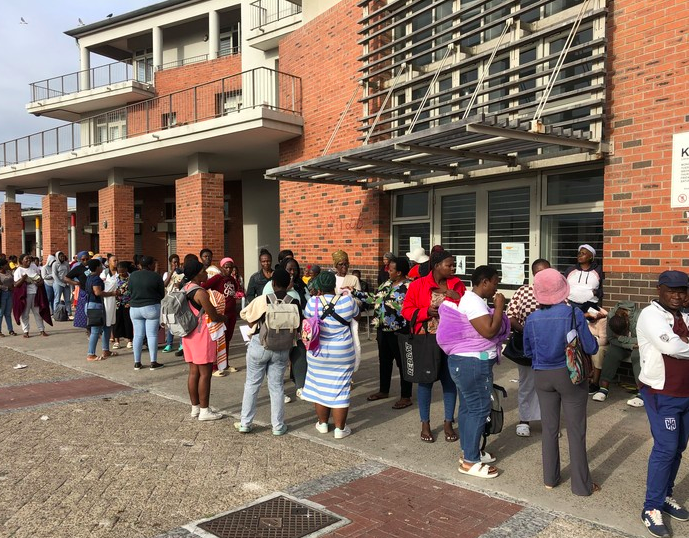Queues for social grants in Kuyasa, Cape Town. Beneficiaries of the Social Relief of Distress Grant are struggling with identity verification processes. Archive photo: Mary-Anne Gontsana
By Marecia Damons
- Beneficiaries are struggling with identity verification for the R370-a-month Social Relief of Distress (SRD) grant, causing delays and access issues.
- The process, which involves facial recognition through an SMS link, has been further complicated by delays at the Department of Home Affairs
- Earlier in July, SASSA rolled out a pilot program in Nelson Mandela Bay for beneficiaries without smartphones to complete the verification process. But many still face difficulties.
Beneficiaries of the R370-a-month Social Relief of Distress (SRD) grant are still battling to complete the identity verification process, leaving them unable to access their grant.
The process, meant to safeguard against identity fraud, has become a stumbling block for many grant recipients.
Since earlier this year, the South African Social Security Agency (SASSA) has required beneficiaries who change their mobile numbers to undergo biometric ID verification. Recently, this requirement has expanded to include beneficiaries suspected of committing identity theft or of being victims of identity theft. This new layer of verification is intended to protect against fraud.
Beneficiaries who want to change their mobile number or who have been identified by SASSA as needing verification must contact SASSA and request identity verification. They will be sent an SMS link to an internet page. They must take a photo of their face and send it back. They will then be told if the process was successful or not.
The system is designed to confirm their identity, but many beneficiaries are reporting problems.
Elizabeth Raiters, deputy director of #PayTheGrants campaign, said they are still inundated with calls from people battling to access their grants. GroundUp has also received complaints from SRD grant beneficiaries who say they never received the verification link they asked for.
Paseka Letsatsi, spokesperson for SASSA, acknowledged the issues. “In instances when the verification function received from the Department of Home Affairs is not available, clients will not receive the link for facial recognition,” he said. In that case, beneficiaries “must request the link again later when the Department of Home Affairs service used by SASSA for verification is restored.”
SASSA previously told GroundUp that it is not essential to have a smart ID, but grant recipients with the old green ID book “have a higher chance of unsuccessful verification when doing the facial biometrics”. This is due to the poorer quality of photos in the green book.
Letsatsi said if the biometric test fails, beneficiaries will have to get a new ID which includes advanced biometric features.
The number of SRD grant beneficiaries varies between 7.5-million and 8.5-million, as recipients are subjected to monthly means tests. Letsatsi said that 100,583 beneficiaries have successfully completed the facial biometric process.
To address the widespread difficulties, SASSA launched a pilot programme earlier this month in the Nelson Mandela Bay metro. This allows beneficiaries without smartphones to use webcams at local SASSA offices to complete their verification.
Letsatsi said the pilot programme helped over 170 clients across four offices in the Nelson Mandela Bay metro, and SASSA plans to expand this service to other provinces.
Raiters said she and the rest of the #PayTheGrants team have worked “endlessly” to assist beneficiaries struggling to access their money due to the ID verification process. “I did an interview recently with the SABC and I gave my cell number so that beneficiaries can WhatsApp their cellphone and ID numbers to me and I will forward it to my contact at SASSA…Since then, my phone has been going off non-stop with beneficiaries asking for help,” said Raiters.
Some beneficiaries who contacted Raiters said they had waited for more than six weeks to receive their SMS with the link to verify their identity. “The people who have green ID books are not receiving the link,” said Raiters.
“I’ve been working non-stop with beneficiaries queuing outside my gate. Last week, a beneficiary woke me up at 7am screaming at my gate,” said Raiters.
“If there’s no local Home Affairs office in your area, you need to pay to get transport there. You also need to book an appointment to get an ID, but the bookings are full,” she said. Raiters has assisted beneficiaries to book appointments to get their ID cards, but the first available dates are from 28 August. “How must these beneficiaries survive?” she asked.
Follow African Insider on Facebook, X and Instagram
Picture: GroundUp
For more African news, visit Africaninsider.com


